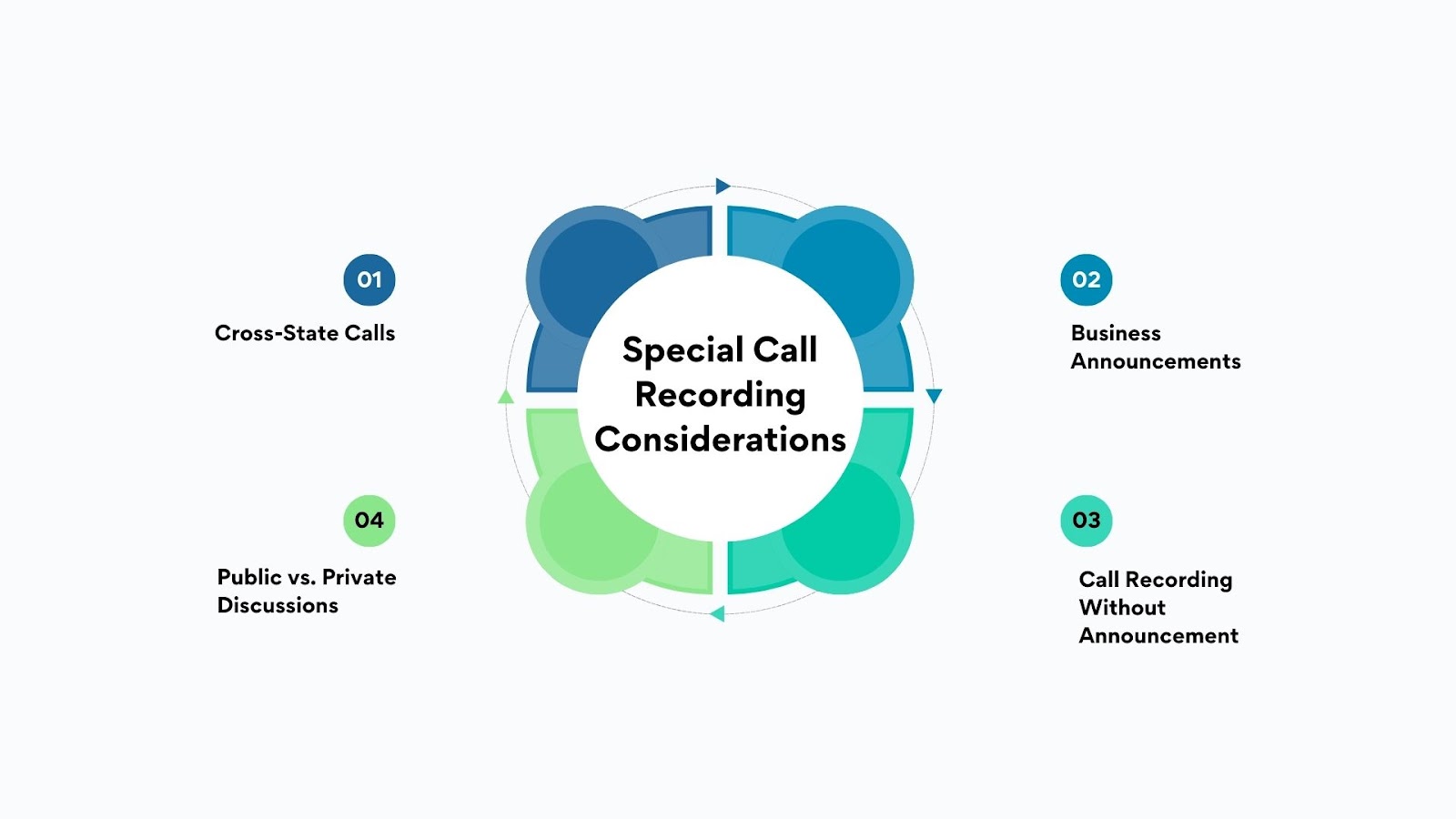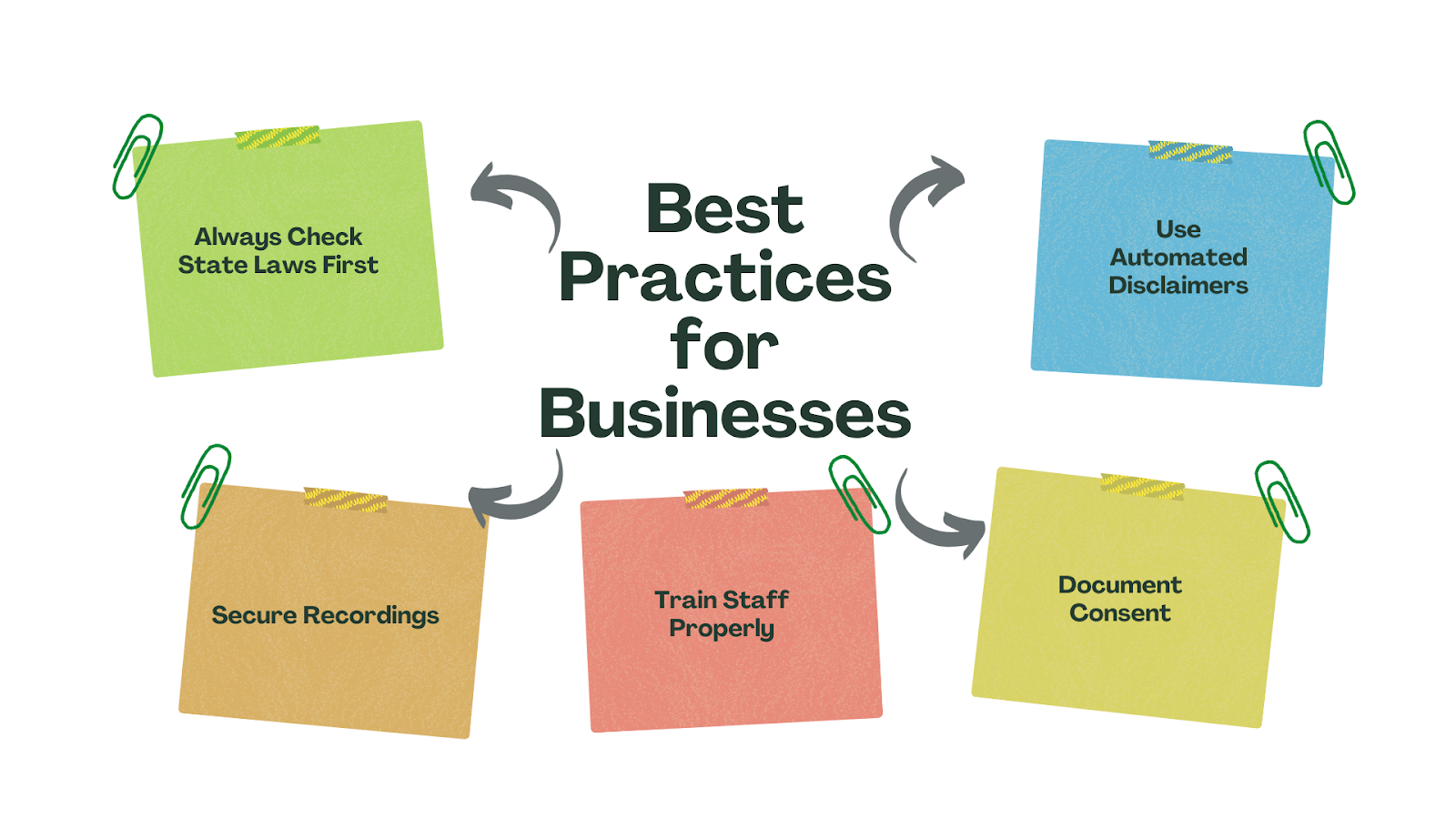Call recording has become an essential element of contemporary business practice. From enhancing customer relations to conflict resolution to regulatory compliance, organizations across various industries leverage call recordings to maximize quality, training, and transparency.
But recording a telephone conversation or a face-to-face conversation has severe legal consequences if one does it without adhering to the law. The United States of America lacks a single overarching call recording law; rather, call recording legislation by state varies considerably.
That is the reason why it is absolutely crucial for individuals and businesses that want to record calls legally and ethically to be aware of the difference between one-party consent states and two-party consent states.
Understanding Call Recording Consent Legislation
In order to understand the state-by-state overview, it's helpful to have a grasp of the general idea of call recording consent laws. These laws dictate whether and under what conditions consent should be obtained before recording a call.
- Federal Law Standard (One-Party Consent)
Under US federal law, one-party consent applies. It is permissible if either of the parties in the conversation, either you or one of the other caller has consented to the recording.
Example: You are part of the conversation. Under federal law, you can legally record a conversation without informing the other party.
- State Law Variations
States can render the law tighter. There exist two-party consent laws that some states have enacted, whereby all parties consent prior to the discussion being recorded. Disobedience to such laws is enough to complete criminal charges, civil actions, or both.
- Why This Matters for Businesses
If your company has operations in more than one state or places interstate calls, watch out. A call legal in your state might be illegal if the other party is in a state whose consent law is tighter.
One-Party Consent States
In one-party consent states, you need only one of the parties in the conversation to be aware and agree to be recorded. You can go ahead and record without warning if you are one of them.
One-party consent states will accept call recording without announcement as long as you are part of the conversation.
Examples of One-Party Consent States:
Alabama, Alaska, Arizona, Arkansas, Colorado, Georgia, Hawaii (face-to-face), Idaho, Indiana, Iowa, Kansas, Kentucky, Louisiana, Maine, Minnesota, Mississippi, Missouri, Nebraska, New Jersey (special provisions), New Mexico, New York, North Carolina, North Dakota, Ohio, Oklahoma, Oregon (face-to-face), Rhode Island, South Carolina, South Dakota, Tennessee, Texas, Utah, Vermont, Virginia, West Virginia, Wisconsin, Wyoming.
Example Situation
You are a Texas sales representative on the phone with a customer. You want to record the call so that you can make reference to the customer's specifications later. Because Texas is a one-party consent state, and you are one party to the conversation, you have permission to tape without prior permission.
One-Party State Business Tip: Although the law will not demand notice to the other party, notice can foster openness and trust, particularly in customer relationships.
Two-Party (All-Party) Consent States
In two-party consent states or all-party consent states, every participant in the conversation needs to be informed and agree to be recorded before a recording may occur. That will include phone conversations, video calls, as well as in-person discussions in some cases.
Recording without authorization in these states is mostly prohibited and may come with significant fines.
Examples of Two-Party Consent States:
California, Connecticut, Delaware, Florida, Illinois, Maryland, Massachusetts, Montana, Nevada, New Hampshire, Pennsylvania, and Washington.
Example Scenario:
You are a California customer service representative wishing to record a support call. You need to first notify the caller and obtain written or oral consent before turning on the record button.
Business Tip in Two-Party States: Begin with an automated notice at the beginning of the call, like This call may be recorded for training and quality purposes, and allow a pause for the customer's acknowledgment before proceeding.
Special Call Recording Considerations

- Cross-State Calls
If you and the opposing side are from different jurisdictions, you could be governed by conflicting laws. The best you can do is comply with the more restrictive law, i.e., getting all concerned authorization. This avoids legal uncertainty and shields your company against liability.
- Business Announcements
Automated call recording messages are used by most companies as a compliance measure. This is not only legally compliant, but it also provides the tone for a professional and open discussion.
- Public vs. Private Discussions
While public discussions might be more restricted than private ones, context is applicable. If the discussion is reasonably believed to be private, there is consent legislation to consider.
- Call Recording Without Announcement
Although legal in one-party states, it undermines trust when recording fact recorded is later discovered. Best practice for client-facing work is proactive disclosure.
Is It Illegal to Make Secret Recordings of Phone Calls
The answer varies by where you and the other party are:
- In two-party consent states, secret recording is typically illegal.
- In one-party consent states, it's fine if you're included in the conversation.
- For interstate calls, err on the side of caution and seek overt consent.
Risks of Non-Compliance:
- Criminal charges for unlawful wiretapping.
- Civil lawsuits for privacy invasion.
- Reputational damage that can erode customer trust.
Best Practices for Businesses

- Always Check State Laws First
Legislation might change. Before rolling out call recording, check what the current regulations are in your state and any states with customers.
- Use Automated Disclaimers
A notice of recording, like "This call may be recorded for quality purposes" at the start, is a good and best practice way of gaining consent.
- Secure Recordings
Render recorded calls secure with encryption, password protection, and controlled access to avoid unauthorized listening or disclosure.
- Train Staff Properly
Staff should be told when, how, and what to do if a client complains.
- Document Consent
Keep records or voice recordings of verbal contracts to secure your business in case consent is questioned later.
How Pepsales AI Supports Call Recording Compliance
Pepsales AI enables businesses to automate call recording easily and comply with legal needs in one-party consent and two-party consent regions.
With capabilities such as:
- Integrated automated announcements to notify callers regarding the recording.
- Encrypted storage options to archive sensitive information.
- Role-based access control so that only cleared personnel can access recordings.
- Compliance monitoring tools to track consent and leave audit trails.
Pepsales AI eliminates the call recording consent legislation nuance so your business can concentrate on delivering tremendous customer experiences without getting caught in legal pitfalls.
Final Word: Is Call Recording Legal
The short answer varies. In a one-party consent state, you may record legally if you are a party to the call. In a two-party consent state, you must have all parties' consent. Everyone.
For companies, particularly call centers, sales forces, and customer service departments, call recording compliance by state is more than staying out of trouble. It's about creating a strong foundation of trust with customers and ethically doing business.
If unsure, use this golden principle: Always disclose, always obtain consent.
Ready to Record Calls Like a Pro?
Pepsales AI enables you to automate your call recording practice, be fully compliant with state law, and build stronger customer relationships.
- Stay out of legal trouble
- Safeguard your data
- Enhance the quality of your service
Start today with your compliance-approved call recording. Book a Demo with Pepsales AI




.avif)



.avif)
.avif)
.avif)
